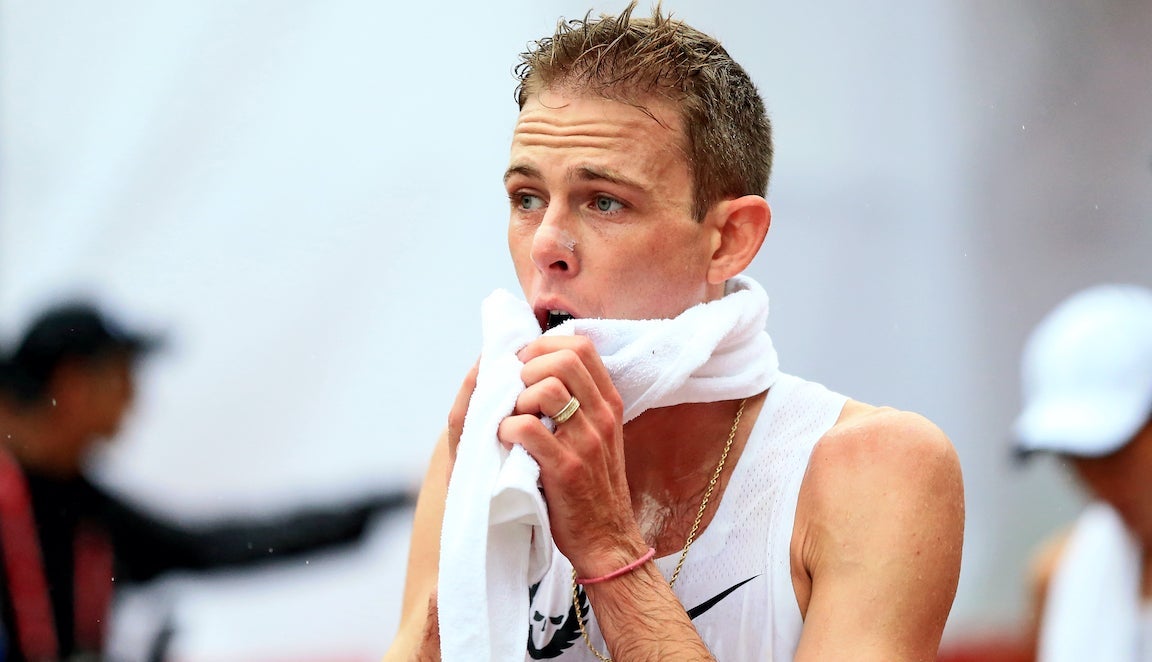People love to hate on Galen Rupp. Although he’s one of the best American distance runners of his generation, the running world has a hard time rooting for him.
When you talk about athletes such as Kobe Bryant, Floyd Mayweather or Tom Brady, their names alone elicit feelings of excitement and pride, or you immediately begin to think of all the reasons why they are the worst. Oftentimes, when great athletes aren’t adored by fans, it’s because their personal lives are messy and disappointing; or, how they act on the court, in the ring or on the field, makes them unlikeable.
Yet with Rupp, you can’t really say it’s because his off-screen personality is offensive or that he’s not a team player; in fact, his teammates seem to really like and respect him.
For his part, the Nike athlete is known for rarely giving interviews and choosing family instead of spending time on social media. It’s this separation from the running community that may be part of the problem. America loves a good punching bag, and the less access we have to a public figure, the less real they become in our minds, and the easier to…well, punch.
He’s also coached by Alberto Salazar, the infamous name behind the Nike Oregon Project, a training group that has been in the news since 2015 when and the BBC stated that its athletes were being investigated for illegal performance-enhancing drugs. Again, in 2017, furthered those doping allegations and called out Salazar as violating drug protocols with his elite runners. So far, Rupp has never tested positive for PEDs.
If you’re reading this article though, you likely already knew all of this.
Over the weekend, during all the press events at the , I saw a side of Rupp that differed from not only what has been written about him but also how he came off in Boston last April. What was clear over the course of those three days was that the pro runner just wants to do what he loves and all we want to do is fault him for it.
This past spring, Rupp was favored to win the Boston Marathon thanks to his first-place finish in Chicago only six months earlier and his second-place finish in the event in 2017. But four days before the elites crossed the finish line on Boylston Street, published another piece on Salazar. The article pointed fingers at both Rupp and his teammate Jordan Hasay, questioning whether their performances were due to illegal supplements and whether their choice to continue to train under Salazar was telling.
During the elite press conference, when asked about the investigations into his coach, the athlete seemed bothered but answered by saying, “We all addressed those allegations several years ago and we moved on after that.” Within seconds he was turned back around to take questions from other reporters. He went on to DNF on Marathon Monday due to brutal weather conditions that led to symptoms of hypothermia.
Fast forward to October and Rupp had a new win under his belt following the Prague Marathon in which he finished in 2:06.07 and was ready to tackle the Chicago course as the defending champion. Relaxed and amicable, the 22-year-old 32-year-old sat amongst a sea of reporters and politely answered questions with a very boy-next-door charm throughout the weekend.
In every situation, he was visibly more at ease than in Boston and in higher spirits—often joking with former teammate Mo Farah and playfully sharing quips with the press. The juxtaposition of how he’s been portrayed in the media and the person standing before me seemed to be two totally different people. It’s hard to look at a person who is smiling and positive as the jerk neighbor kid who doorbell ditches you every Friday night. Rupp is likeable, and easily so.
Following the race, he and pro triathlete turned pro runner spoke to the media again, this time as the , respectively, in their divisions. Jorgensen, a newcomer to the marathon who already seems to have gained more support from the running community than Rupp has, came down hard on herself, noticeably agitated by her performance.
“For me personally, I let myself have 24 hours of kind of being pissed off and you guys are sort of seeing that because it’s within 24 hours. And then I go back and evaluate the positives,” said Jorgensen. “There’s definitely positives that came out of this race but I really feel like my training was indicative of faster racing and on the day it didn’t happen.”
On the other side of the fence, Rupp, a seasoned veteran in the event, spoke optimistically about his time and seemed to better understand that you can’t win every race. “I ran as well as I could today, and I gotta give credit to Mo and all the other guys that beat me,” said Rupp. “They were better today and they ran well. I’m real happy for Mo, I think he ran a great race. Thrilled for Suguru [Osako] to get the Japanese record, I know he’s been working real hard.”
Maybe Rupp is just growing up and we’re seeing a side of him that is more peppered and gracious, or maybe the media has gotten it wrong all along. He’s always had the choice to leave Salazar’s side and I’m guessing until he does, there’s going to be an inherent distrust in him. You are the company you keep, right?
If you take a closer look though, you may start to realize that this runner is exactly who he shows himself to be: a personable and very talented athlete who is just trying to do his job. “It’s really a never-quit mentality, you have to just keep fighting, not get discouraged, not get down on yourself … and keep pushing as much as you can,” says Rupp. “You never want to just throw in the towel and give up.”


